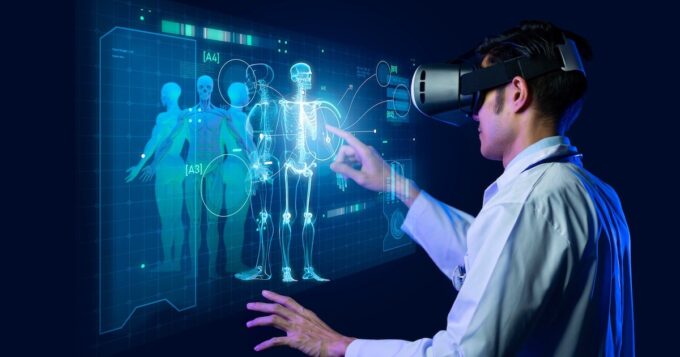

Advances in AI have transformed many fields, one of which is healthcare. Health workers can perform health care more accurately and effectively with the sophistication of AI. Many benefits can be gained from the advancement of AI for healthcare, let’s explore further in the following article.
About AI in Healthcare
Human intelligence is the main concept of AI, things that require human intelligence can be done by AI. The implementation of AI has taken various forms and has developed significantly from then until now. As one example, we can feel AI’s sophistication from search engine technology.
In the healthcare field, AI also plays a crucial role because of its tremendous benefits. Various complex algorithms combined with the application of machine learning can be utilized for useful analysis for diagnosis and other doctor’s needs. Machine learning has an important role, it can make AI process data learning and boost performance for relevant results.
For those of you working in healthcare, it’s important to understand the various implementations of AI in the field. AI can be an important factor for a promising future for healthcare to be more efficient and effective. Various innovative developments have been discovered with the sophistication of AI.
Diagnosing diseases is one of the activities of medical personnel, and can be done more easily and effectively using AI technology. From previous patients, data is obtained and then combined with advanced algorithms so that AI can detect symptoms and determine the best treatment.
The utility in many industrial fields is indeed to make things fast. But AI management also needs to approach effective results or not underestimate the effectiveness.
How Advanced AI is Transforming Healthcare
There are many benefits that patients and healthcare workers can experience with the implementation of AI. To understand more about how AI can advance the healthcare field, take a look at the following points:
– Data-Driven Patient Care Optimization And Patient Care Management
Patient care planning is one of the most important things in medicine. Once planned, care must be optimized to achieve the best outcome for the patient. Advanced AI can contribute greatly to care management so that it can be relevant to the patient’s specific needs.
The implementation of AI can analyze various kinds of patient data. The patient data itself is quite diverse, ranging from genetic data, medical reactions, medical history, and so on. These data are used to get the most appropriate treatment recommendations. When needing to prepare therapy or treatment, AI can consider these various factors.
Treatment of patients can also be tailored to the details of the patient’s needs even if they are very specific. If treatment actions are determined appropriately, then the patient’s chances of recovery will be greater. To support overall care management, AI plays an important role.
Data analysis can be done in real-time and quickly. Various valuable information about the patient can be obtained easily and then conveyed to medical personnel. When there are certain changes in the patient, the medical staff can know quickly. AI can monitor various health parameters and detect abnormal changes.
Doctors can pick up on early warnings so that solutions can be taken before the situation worsens. In the case of chronic medical conditions, this plays a vital role.
Read also : Blockchain Technology Integration In Supply Chain Management
– Improving Diagnosis
To make the diagnosis more accurate, AI can be of great help. This is the first step to treating a patient, but although it is very important, there are times when certain details are difficult to detect when making a diagnosis. Errors in diagnosis can be quite fatal, especially in high-risk cases.
AI with its advanced algorithms can analyze the patient’s condition thoroughly to get accurate diagnosis results. Data is first collected and then analyzed with the help of diagnosis. AI can help us find the correlation of a disease with certain symptoms.
The various combinations of risks in healthcare are often very complex and AI can make managing them easier. The amount of data obtained will make the diagnosis more accurate. For early detection, AI also plays a crucial role.
Disease development can be prevented by implementing AI that can identify various risk factors. Various recommendations from bellevuecn.com for preventive measures can be obtained with AI data learning.
– AI For Drug Development
Developing drugs requires complex procedures but can be simplified with AI. Drug development no longer needs to sacrifice a lot of time and effort due to the sophistication of AI technology. To support clinical trials, AI can properly identify which drug candidates have effective benefits.
AI can analyze a wide variety of molecular data and identify what properties are needed in a drug product. AI will also determine which compounds should be used and combined for accurate treatment results. Not only does this increase the success of clinical trials, but it can also reduce unnecessary costs.
Read also : Sustainable Urban Environments: Challenges and Strategies
– Improving Patient Therapy
After a certain therapy, the patient will respond. Despite using the same therapy, the reaction of each patient can be different. AI, with its function to analyze various patient data, can predict how patients will respond. Various genetic factors are considered by AI to make these predictions.
Not only genetic details but also other factors such as environmental factors, the patient’s medical history, and various other factors. Through the analysis of these complex factors, the patient can be better ensured to get the most appropriate therapy. If the therapy applied to the patient is relevant enough, then the patient can recover faster.
Ineffective therapies and drugs can be avoided with the implementation of AI in determining patient therapy. Not only can it improve the effectiveness of actions against patients, but it is also important for medical safety. Certain high-risk therapies can be avoided as much as possible, especially for patients with serious medical conditions.
Because there is a lot of patient data to analyze, it would not be efficient with manpower alone. Various therapies, even very detailed ones, can be designed efficiently and according to the patient’s specific condition. It is very important to determine the drug dosage to perfect the therapy and the AI can determine the most optimal dosage.
Targeted care is one of the important visions of medical personnel. To ensure that various healthcare procedures are efficient and effective, advanced AI implementation can support them well.
